Houthis Threaten Red Sea Shipping Amid Ceasefire

The ongoing conflict between Israel and Hamas has drawn in various regional players, including Yemen’s Houthi movement. Abdul Malik al-Houthi, the leader of the Houthis, has made it clear that his group will closely monitor the ceasefire agreement between Israel and Hamas. He warned that if the ceasefire is violated, the Houthis will continue their attacks on ships in the Red Sea. This situation raises significant concerns for maritime security in a crucial shipping lane.
Ceasefire Agreement and Houthi Actions
The ceasefire agreement between Israel and Hamas is set to enter its first phase on Sunday, lasting six weeks. This deal aims to reduce hostilities and provide a temporary respite for civilians caught in the crossfire. However, the Houthis have declared their intention to maintain their campaign against merchant vessels in the Red Sea. Since November 2023, they have targeted over 100 ships, significantly impacting maritime traffic between Asia and Europe. Their attacks have forced many vessels to reroute, adding time and costs to global shipping operations.
The Houthis have made it clear that their actions will persist until Israeli forces withdraw from Gaza. This stance complicates the already fragile situation in the region. The Houthis’ involvement in the conflict highlights the interconnected nature of Middle Eastern geopolitics. Their support for Hamas aligns them with other groups opposing Israel, further escalating tensions in the area. As the ceasefire begins, the international community will be watching closely to see if the Houthis will follow through on their threats or if they will adhere to the terms of the agreement.
International Concerns and Maritime Security
The ongoing threats from the Houthis have raised alarms among international shipping organizations. Guy Platten, the secretary-general of the International Chamber of Shipping, emphasized the importance of ensuring the safety of seafarers. He specifically mentioned the crew of the Galaxy Leader, a car carrier that was hijacked by the Houthis 14 months ago. Platten stressed that the release of the crew should be part of any sustained ceasefire deal. This highlights the human cost of the conflict and the need for a comprehensive approach to resolving the crisis.
Despite the Houthis’ recent focus on Israel, there have been no confirmed ship strikes in 2025 so far. Instead, the militant group has directed its efforts toward launching drones and missiles at Israeli targets. In response, Israeli, US, and UK forces have increased aerial attacks on Houthi military installations. This escalation of military actions raises the stakes for maritime security in the Red Sea. The potential for renewed attacks on shipping lanes remains a significant concern for global trade and regional stability.
As the ceasefire takes effect, the situation remains fluid. The actions of the Houthis will be crucial in determining the future of maritime safety in the region. The international community must remain vigilant and proactive in addressing these threats to ensure safe passage for vessels traversing one of the world’s busiest shipping routes.
